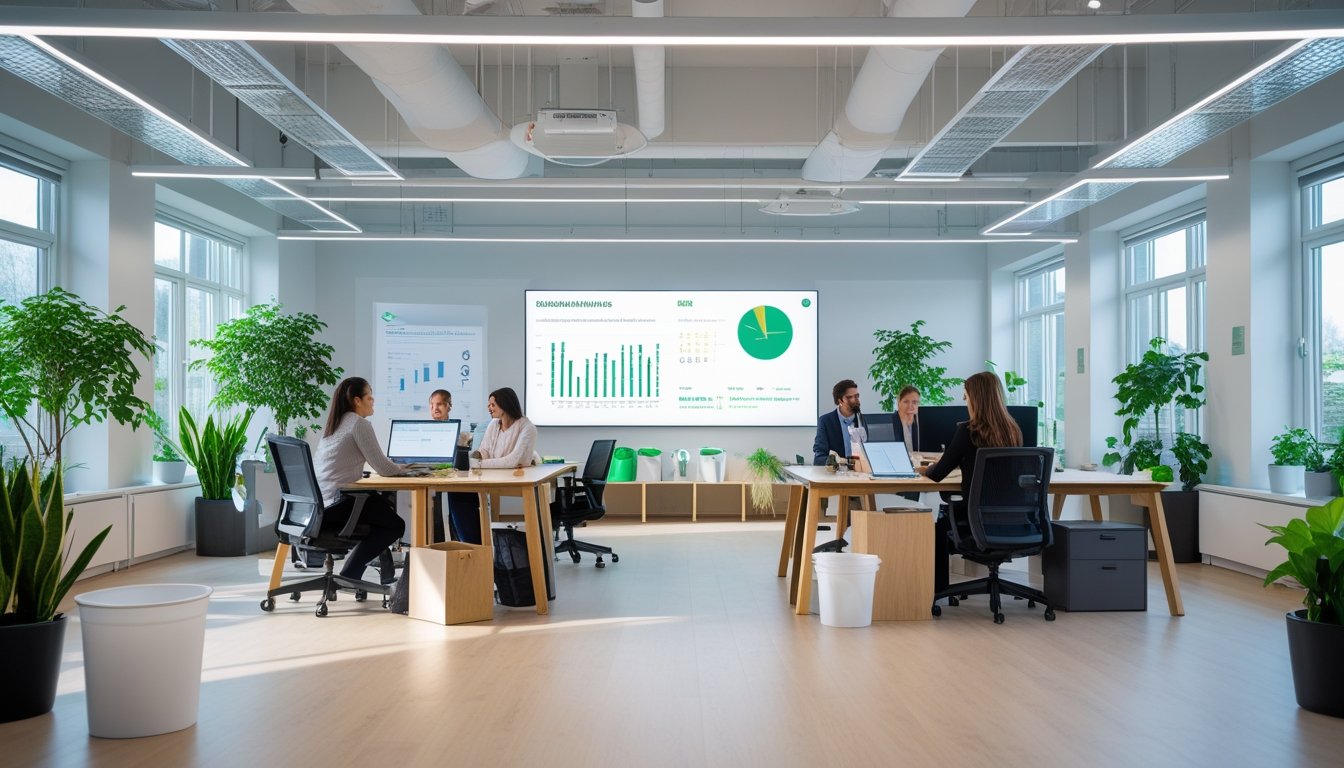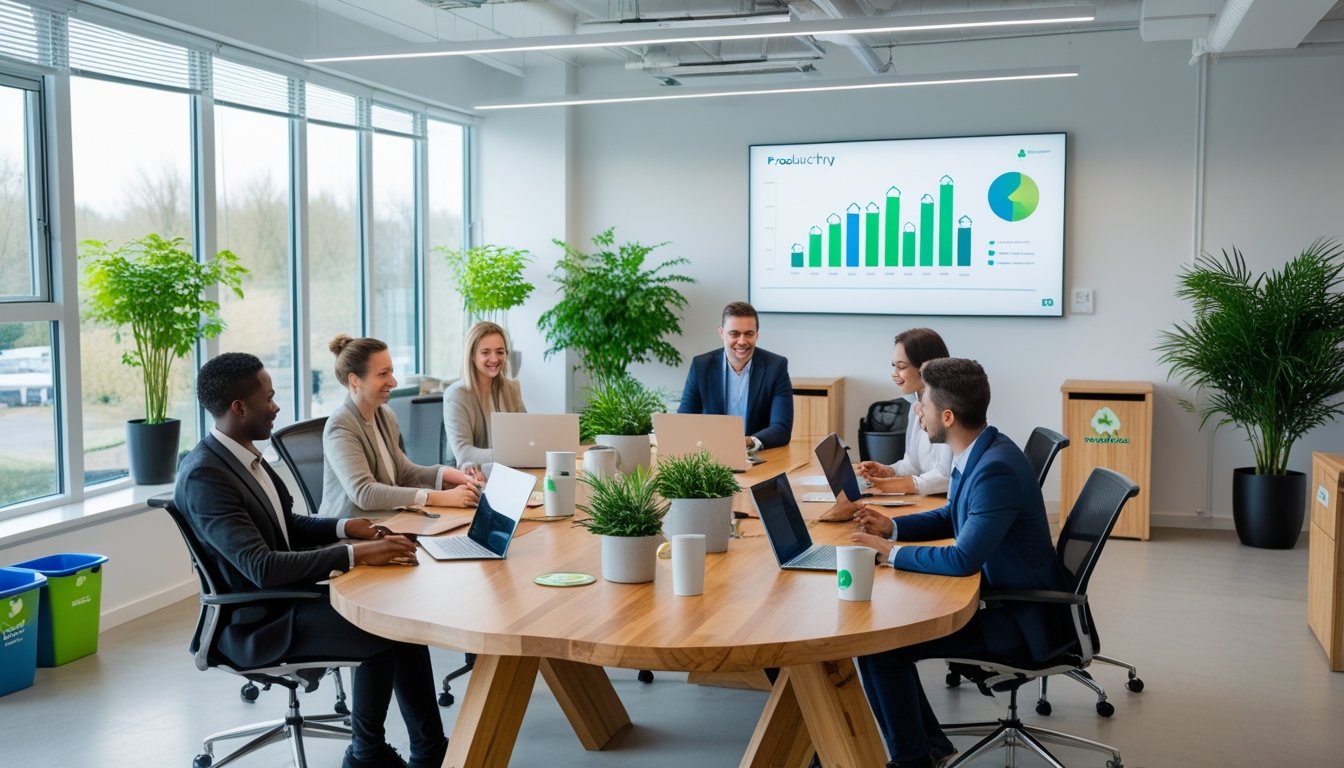Late updated: 25 Aug 2025 09:08
Written by: Amber Collins
Enhancing UK Office Efficiency Through Eco-Friendly Practices: A Sustainable Approach
Adopting eco-friendly practices in UK offices is no longer just a noble pursuit but a strategic necessity. Incorporating sustainable strategies not only preserves the environment but significantly boosts office efficiency and reduces operational costs. By embracing these practices, we can create healthier work environments that enhance employee well-being, productivity, and satisfaction. This movement towards sustainability reflects a growing recognition of the profound benefits that green initiatives can bring to our daily operations.

Transitioning to energy-efficient systems and materials also showcases our commitment to corporate responsibility, resonating deeply with clients and partners who value sustainable practices. Implementing such measures may seem daunting at first, but they can be seamlessly integrated over time to yield substantial rewards. Our journey towards sustainability involves simple yet impactful changes such as reducing waste, improving energy consumption, and using eco-friendly office supplies.
Businesses that prioritise such changes will find themselves at the forefront of a powerful movement that aligns profitability with positive environmental impact. As we explore these practices, the impact on our offices and the environment is undeniable, encouraging a cultural shift towards sustainability. This article will guide us through the essential strategies transforming UK offices into models of efficiency and eco-friendliness.
Key Takeaways
- Eco-friendly practices boost office efficiency and reduce costs.
- Energy-efficient systems enhance corporate responsibility.
- Sustainable strategies are integral to modern business success.
Core Eco-Friendly Strategies for UK Office Efficiency

Adopting eco-friendly strategies in UK offices significantly enhances operational efficiency. By implementing energy and resource management techniques, innovative office designs, and digital solutions, we can reduce our environmental impact and improve workplace productivity.
Energy and Resource Management
Managing energy and resources responsibly is essential in reducing both costs and carbon footprint. One of the most effective measures is the use of energy-efficient appliances, such as those rated by Energy Star. Installing solar panels provides renewable energy that powers the office sustainably. Using LED lighting throughout the workspace reduces energy consumption and enhances lighting efficiency, as these lights last longer and use less power.
Incorporating natural light not only lowers energy use but also boosts productivity and improves employee well-being. Smart thermostats and HVAC systems provide precise temperature control, optimising energy use while maintaining a comfortable work environment. Employing these solutions contributes to a sustainable future by cutting greenhouse gas emissions.
Green Office Design and Biophilic Elements
A green office design focuses on both aesthetics and sustainability. Implementing biophilic design principles by bringing natural elements into the office substantially affects air quality and employee satisfaction. Indoor plants are a key component, as they improve air quality by reducing toxins and enhancing mood and productivity.
Utilising recycled and sustainable materials in office furniture and décor is another way to minimise environmental impact. Open floor plans with communal spaces, coupled with natural lighting, foster collaboration and create an invigorating workspace. By aligning our work environment with sustainable practices, we promote a healthier and more efficient office culture.
Digital Documentation and the Paperless Office
Transitioning to a paperless office greatly reduces waste and streamlines operations. Digital documentation systems provide an eco-friendly alternative, significantly lowering reliance on paper. These systems enhance organisation, facilitate easy access to documents, and reduce physical storage needs. As more businesses adopt sustainable practices, moving towards digital helps minimise carbon footprint related to paper production and waste.
Cloud-based solutions and secure digital file sharing eliminate the need for printing, increase operational efficiency, and support remote working capabilities. Adopting these technologies results in cost savings and a more sustainable, energy-efficient workplace, setting a precedent for environmental stewardship. By embracing these strategies, we make strides towards a greener and more efficient office environment.
Integrating Sustainable Practices and Culture in the Workplace
Our goal is to create a workplace culture that prioritises sustainable practices such as waste reduction, sustainable procurement, and green commuting. By integrating these elements, businesses can not only enhance efficiency but also contribute positively to environmental and social goals.
Waste Reduction and Recycling Programmes
Effective waste management starts with implementing recycling schemes across the office. We can place clearly labelled recycling bins in accessible locations to encourage proper disposal of materials. Using recycled paper and digital documentation lowers our dependency on new resources. Reusable containers for storage and meals help reduce single-use plastics. Educating employees about these practices can heighten employee engagement and commitment to sustainability. By systematically tracking our progress, such as with metrics, we ensure continuous improvement.
Sustainable Procurement and Green Certification
Sustainable procurement is key to aligning operations with environmental goals. We can incorporate sustainability certifications like ISO 14001 in our supply chain to ensure responsible sourcing. Emphasising ESG goals in procurement decisions not only minimises our carbon footprint but can also enhance our brand reputation. Choosing locally sourced, biodegradable, and energy-efficient products further integrates eco-friendly values into our operations, leading to long-term financial savings and environmental benefits.
Green Commuting and Employee Engagement
Promoting green commuting options among employees can significantly cut emissions. We may introduce incentives for carpooling, cycling, or using public transport. Employees can participate in ride-sharing programmes that make daily travel more sustainable. Fostering an eco-conscious mindset strengthens employee productivity by creating a healthier work environment. By engaging regularly with our workforce on these topics, through workshops or communication channels, we cement sustainability as a shared responsibility, making each member of the team a champion of positive change.
Frequently Asked Questions

In addressing eco-friendly office practices, it's key to explore practical steps that foster sustainability. This involves integrating energy-efficient technologies, adopting green habits, and incorporating simple yet impactful lifestyle adjustments.
What are effective measures for creating a sustainable workplace environment?
To create a sustainable workplace, offices can implement initiatives such as using energy-efficient lighting and appliances, promoting waste reduction through recycling, and sourcing eco-friendly office supplies. Prioritising natural light and improved air quality can enhance the work environment.
Could you suggest five practices to enhance sustainability within an office setting?
Firstly, install energy-saving LED lights. Secondly, reduce paper usage by digitising documents. Thirdly, encourage recycling throughout the office with designated bins. Fourthly, set up a carpool or bike-to-work programme. Finally, choose office products made from recycled or sustainable materials.
What steps can businesses take to integrate eco-friendly initiatives into their daily operations?
Businesses should start with an energy audit to identify areas for improvement. Incorporating renewable energy sources and motivating employees to engage in sustainable practices is also essential. Additionally, offering training on eco-friendly habits can help create a culture of sustainability.
How can organisations ensure the longevity and effectiveness of their sustainability strategies?
Long-term sustainability requires regular evaluation of current practices and adjustment as needed. Setting measurable goals and tracking progress ensures accountability. Engaging stakeholders such as employees and suppliers in sustainability goals helps maintain focus and commitment.
In what ways can offices implement the 'Go Green' initiative to foster an eco-conscious work culture?
Creating an eco-conscious culture involves clear communication of sustainability goals and incentives for green practices. Encouraging remote work to reduce energy usage and promoting a paperless office environment are effective strategies. Incorporating plants indoors can also enhance air quality and well-being.
What methods are there to assess and improve the sustainability of current business practices?
Utilising sustainability benchmarks and third-party certifications can help assess current practices. Regular sustainability reports offer insights into areas needing improvement. Encouraging feedback from employees can also help identify practical enhancements in everyday operations.
